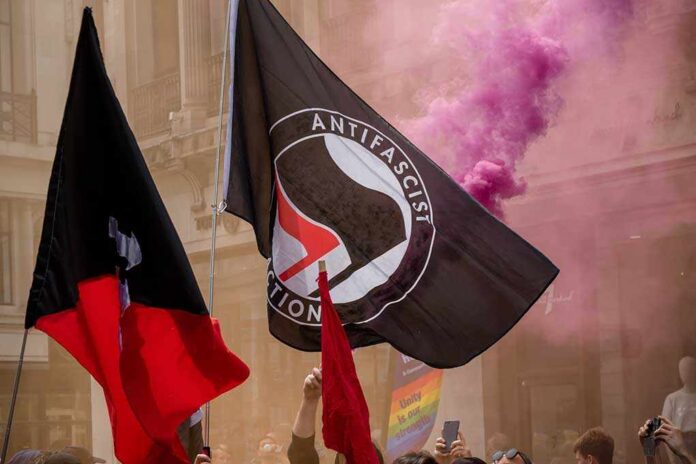President Trump’s crackdown on Antifa-linked groups with historic foreign terrorist designations has ignited fierce debate over civil liberties, the Constitution, and the future of protest in America and Europe.
Story Snapshot
- The U.S. State Department designated four Antifa-affiliated groups in Germany, Italy, and Greece as Foreign Terrorist Organizations—a first in history.
- President Trump’s executive order and new security focus signal a shift from targeting jihadist threats to left-wing extremism.
- Hungary and European right-wing parties are pushing for similar designations, but EU-wide action faces legal and political hurdles.
- Critics and experts warn of dangerous precedent, threats to civil liberties, and politicization of terrorism laws.
Trump Administration’s Unprecedented Move Against Antifa Abroad
On late September 2025, the U.S. State Department, under President Trump’s directive, designated four Antifa-linked groups in Germany, Italy, and Greece as Foreign Terrorist Organizations, marking the first time American authorities have officially labeled Antifa-affiliated entities as terrorist threats outside the U.S. The announcement followed Trump’s September executive order naming Antifa a domestic terrorist organization, reflecting his administration’s new focus on combating left-wing extremism after years of battling jihadist threats.
State Department makes first-ever Antifa foreign terrorist designations across Europe
Four Europe-based groups to face asset freezes and entry bans https://t.co/rfNGIuxwKg
— Jewhadi™ (@JewhadiTM) November 13, 2025
Hungary, led by Prime Minister Viktor Orbán, quickly echoed the U.S. stance by issuing a decree listing Antifa and a German group as terrorist organizations—the first such action in Europe. This move has emboldened right-wing parties and parliaments across the continent, notably in the Netherlands, where calls for EU-wide Antifa designations have intensified. However, European Union institutions are constrained by legal barriers, requiring unanimous consent for terrorism listings, making bloc-wide action improbable for now.
Legal and Political Tensions in Europe and the U.S.
With Washington’s designations in effect, Antifa-linked groups now face asset freezes, travel bans, and heightened criminal liability for material support. Hungary’s decree is also active, but the EU remains divided over the feasibility and legitimacy of such sweeping terrorism designations. European governments are under increasing pressure to act, while civil society organizations warn of the chilling effect on activism and free speech. Diplomatic tensions have escalated, with critics questioning the proportionality and legal foundation of targeting loosely organized movements like Antifa.
Legal scholars and industry experts highlight the complexity of applying Foreign Terrorist Organization criteria to Antifa, given its decentralized structure and lack of clear hierarchy. Jason Blazakis, a former State Department official, has argued that political will may override legal obstacles, but warns of significant risks. The International Centre for Counter-Terrorism describes the move as a dangerous precedent unlikely to gain EU-wide traction, while Just Security cautions against the internationalization of domestic political conflicts and threats to constitutional rights.
Impact on Civil Liberties, Conservative Values, and Future Policy
Supporters contend that Antifa’s transnational networks justify international action, believing these designations are necessary for national security and the protection of conservative values. They see the Trump administration’s measures as a victory against left-wing radicalism and government overreach. Critics, however, warn that politicizing terrorism laws undermines civil liberties, erodes constitutional protections, and risks suppressing legitimate dissent. The designation has sparked debate over freedom of association and speech, with experts noting that left-wing and anarchist terrorism remains a small fraction of cases in Europe.
For American conservatives, these moves signal a long-awaited response to years of unchecked “woke” agendas, globalist policies, and fiscal mismanagement. The Trump administration’s hard stance is seen as safeguarding family values, traditional principles, and the rule of law. As right-wing parties across Europe leverage the issue for electoral gain, the ripple effects of these designations may reshape political alignments, law enforcement priorities, and the boundaries of acceptable protest for years to come.
Sources:
It Can’t Happen Here? Designating Antifa as a Terrorist Organisation in Europe – ICCT
Trump administration makes first-ever Antifa foreign terrorist designations across Europe – Fox News
Designating Antifa as FTO Could Threaten Civil Liberties – Just Security
Senator Schmitt Calls for Antifa to Be Designated as a Foreign Terrorist Organization
Experts see danger in Trump’s talk of designating Antifa a foreign terrorist group – OPB
Foreign Terrorist Organizations – U.S. State Department
Designating Antifa as a Domestic Terrorist Organization – The White House
Executive Order 13224 – U.S. State Department
Foreign Terrorist Organization (FTO) Designation: Legal Framework – Congressional Research Service











